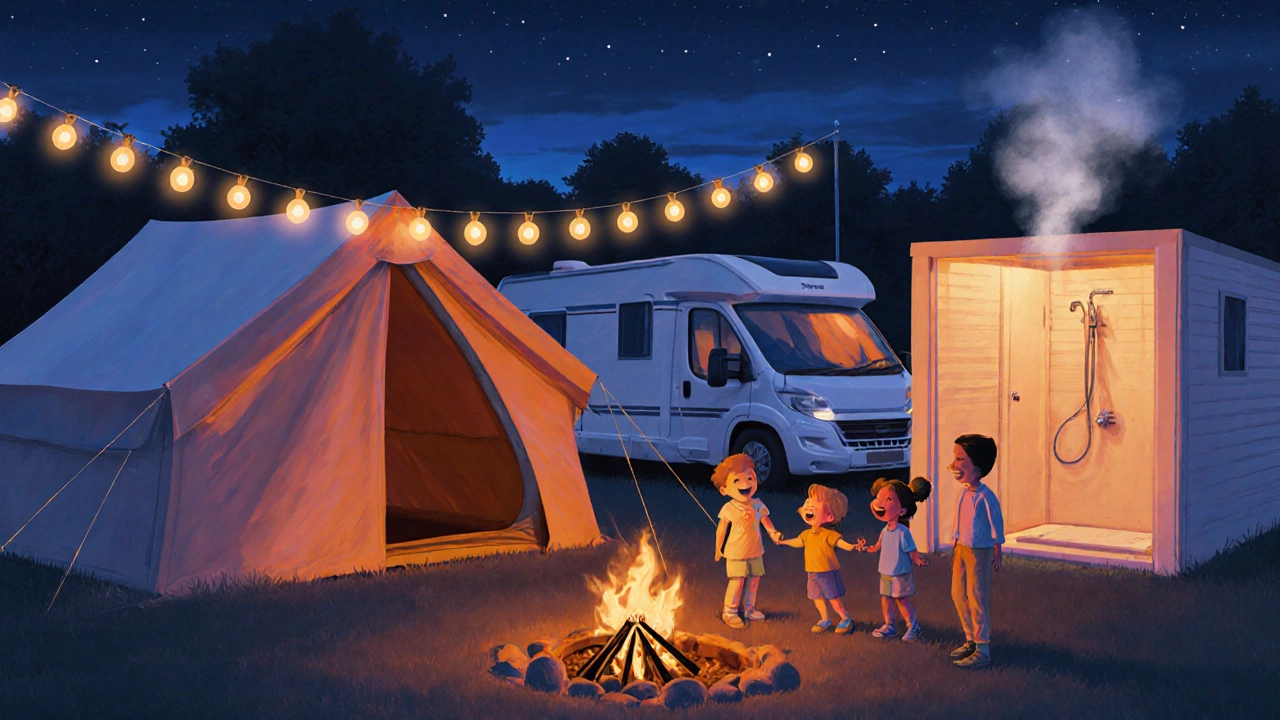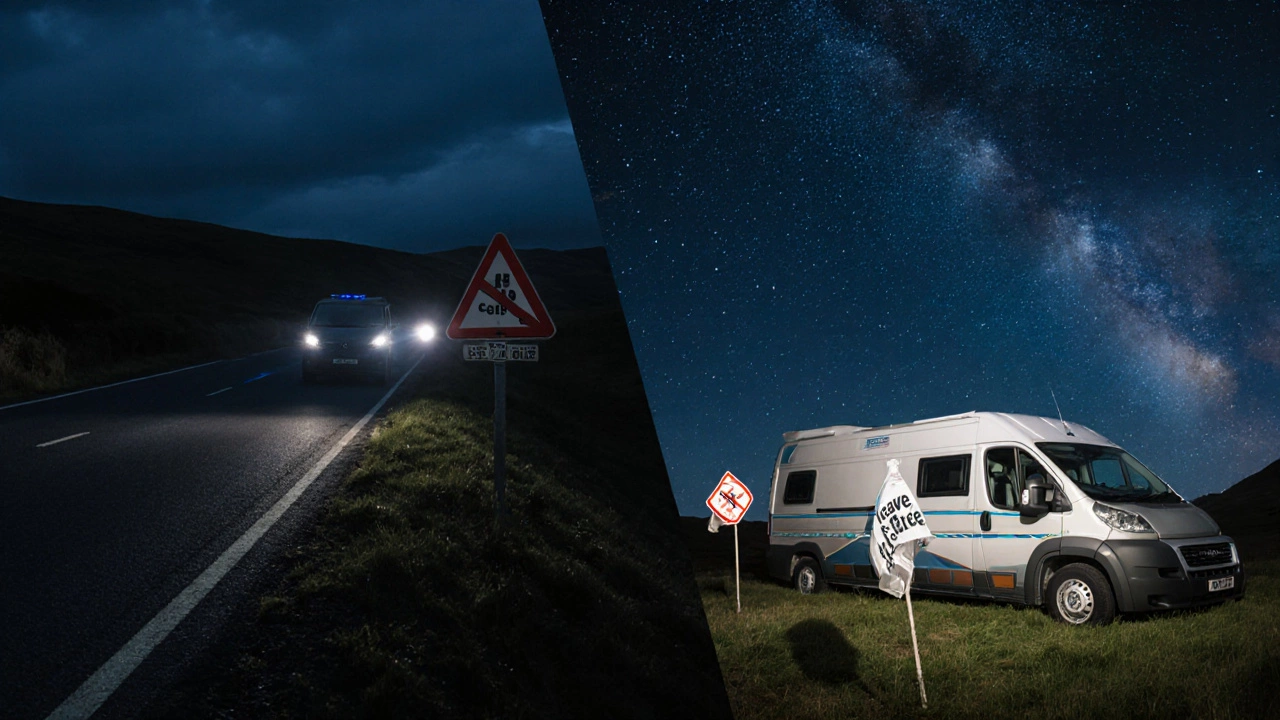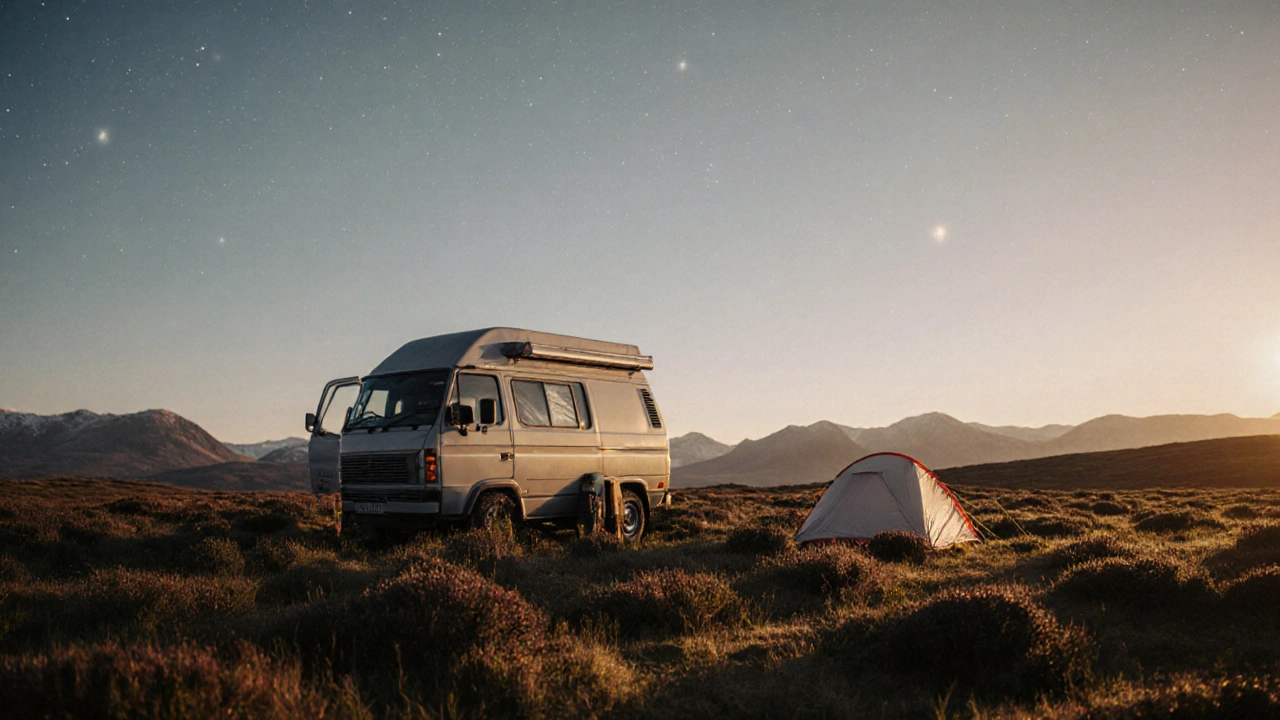People often use the words boondocking and camping like they mean the same thing. But if you’ve ever tried to sleep in your van on a quiet roadside in the Lake District-or set up a tent on a designated campsite with showers and electric hookups-you know they’re not the same. In the UK, where rules around where you can sleep outdoors are tight and confusing, understanding the difference isn’t just helpful. It’s essential to avoid fines, complaints, or worse.
Boondocking Is Free, Off-Grid, and Often Illegal
Boondocking means camping without any facilities. No toilets. No running water. No electricity. No designated spots. You pull over on a quiet lane, park your van or set up a tent near a forest edge, and call it a night. It’s the raw version of outdoor sleeping-no frills, no fees, no staff.
In the UK, boondocking happens mostly in remote areas: the Scottish Highlands, parts of North Wales, the Dartmoor moors, or quiet lanes in Cumbria. But here’s the catch: in England and Wales, wild camping-what most people call boondocking-is technically illegal without the landowner’s permission. That doesn’t mean no one does it. Thousands do. But it’s done quietly, responsibly, and with zero expectation of legal protection.
Scotland is the exception. Under the Scottish Outdoor Access Code, you can camp wild in most rural areas as long as you follow the rules: stay small groups, leave no trace, avoid farmland and buildings, and don’t stay more than two or three nights in one spot. That’s boondocking done right. In England? You’re trespassing. Even if no one sees you.
Camping Means a Designated Site With Rules
Camping, the way most people understand it, means staying at a campsite. These are places that have been approved for overnight stays. You’ll find toilets, showers, sometimes a shop, waste disposal points, and often electric hookups. Sites range from basic fields with a few pitches to luxury spots with hot tubs and WiFi.
These sites are regulated. They need a license from the local council. They pay rates. They follow health and safety rules. And they charge you. Prices vary. A basic pitch might cost £15-£25 a night. A luxury spot with a view of the sea? £50 or more. You’re paying for infrastructure, maintenance, and legal permission to be there.
Most campsites in the UK are run by private owners, national park authorities, or organizations like the Caravan and Motorhome Club or the Camping and Caravanning Club. They have rules: no open fires in some, quiet hours after 10pm, pets must be on leads, and no overnight stays in tents outside your pitch. Break the rules? You’ll get asked to leave-or banned.
Boondocking Is About Freedom. Camping Is About Convenience.
If you’re asking yourself whether to boondock or camp, ask what you value more: freedom or comfort.
Boondocking gives you silence. No generators running. No kids screaming. No next-door neighbors checking their phones. You wake up to birds, wind, or rain tapping on your roof. You park where you want. You leave when you want. It’s the closest thing to true solitude you’ll find in a country with 67 million people.
Camping gives you showers. You can wash your hair. You can charge your phone. You can buy ice cream or coffee without driving 20 miles. You don’t have to carry five liters of water just to brush your teeth. You don’t have to worry about where to dump your grey water.
Boondockers often travel in vans or small RVs. They carry solar panels, portable water tanks, composting toilets, and gas stoves. They plan every drop of water and every watt of power. Campers? They just show up, plug in, and relax.

Legal Risks Are Real-Especially in England
In 2023, a group of van dwellers in the Peak District were fined £500 each for wild camping. In 2024, a farmer in the Lake District sued a group of campers for £12,000 in damages after they left trash and damaged his field. These aren’t rare cases. Police and landowners are cracking down.
England’s laws are strict. The Criminal Justice and Public Order Act 1994 gives police powers to move on groups of six or more people camping without permission. Even one person can be asked to leave if the landowner complains.
Scotland is different. The law there assumes you have a right to access land unless it’s explicitly restricted. But even there, you must follow the Scottish Outdoor Access Code. That means:
- No camping near houses, farms, or roads
- No fires in forested areas during dry seasons
- No leaving trash-not even biodegradable food scraps
- No staying more than three nights in one place
Break these rules? You lose your right to be there. Landowners can call police. You can be prosecuted.
What About Motorhomes? Does It Matter?
Yes, it does. A motorhome isn’t a legal loophole. Whether you’re in a £100,000 A-class RV or a converted van, the law treats you the same as someone with a tent. You still need permission to park overnight on private land.
Some people think motorhomes are exempt because they’re “vehicles.” They’re not. The UK doesn’t recognize motorhomes as permanent dwellings unless they’re registered as such-and even then, you can’t just park anywhere. Local councils often ban overnight parking in town centers, even for motorhomes.
There are exceptions. Some service stations, like those run by Welcome Break or Moto, allow overnight parking for motorhomes. But they’re not campsites. You can’t use the toilets, showers, or waste points. You’re just allowed to sleep in your vehicle. That’s not boondocking. It’s tolerated parking.
Where Can You Actually Boondock Legally in the UK?
There are only a few places where you can boondock without fear of trouble:
- Scotland: Most of the Highlands and Islands, as long as you follow the Access Code.
- Some National Parks: Dartmoor allows limited wild camping in designated zones. The Brecon Beacons sometimes turn a blind eye if you’re quiet and leave no trace.
- Landowner permission: Some farmers and landowners allow overnight stays for a small fee-often £5-£10. Look for signs like “Wild Camping Welcome” or check sites like Park4Night or CamperMate.
- Public land with access rights: A few coastal paths and common lands in Wales and Scotland allow overnight stays.
Don’t assume you can camp anywhere just because it looks empty. A quiet field might be privately owned. A forest track might be a protected conservation area. Always check.

Which One Should You Choose?
If you’re new to outdoor travel in the UK, start with a campsite. Learn how to pack light. Learn how to manage water and waste. Learn how to be quiet and respectful. Then, if you’re ready, try boondocking in Scotland.
Boondocking isn’t for everyone. It requires preparation. It demands discipline. You need to carry everything you need. You need to plan for rain, cold, and isolation. But if you get it right? There’s nothing like it. The stars feel closer. The silence feels deeper.
Camping is easier. It’s safer. It’s predictable. You know where the toilet is. You know you won’t get kicked out at 3am. For families, older travelers, or anyone who just wants a good night’s sleep without stress-it’s the smart choice.
But if you’re chasing freedom, quiet, and a real connection with the wild? Boondocking, done right, is the only way.
What Happens If You Get Caught?
Most of the time, if you’re quiet, respectful, and gone by morning, you won’t get caught. But if you do:
- Police or landowners will ask you to leave. Comply. Arguing makes it worse.
- You might get a warning. Or a fine-up to £1,000 in some areas.
- Repeat offenders can be prosecuted under trespass or anti-social behavior laws.
- Never leave trash. Never start fires. Never block access. One bad camper makes it harder for everyone.
Respect isn’t optional. It’s the only thing keeping wild camping alive in places where it’s not officially allowed.
Final Thought: It’s Not About the Tent or the Van
The real difference between boondocking and camping isn’t gear. It’s mindset.
Camping says: “I want to be outside, but I still want the comforts of home.”
Boondocking says: “I want to be outside, and I’m willing to give up everything to be truly free.”
Neither is right. Neither is wrong. But in the UK, one is legal. The other? It’s a quiet rebellion-and one that needs to be handled with care.
Is boondocking legal in England?
No, boondocking (wild camping) is not legal in England without the landowner’s permission. While many people do it quietly, especially in remote areas, it’s technically trespassing. You can be asked to leave or fined if you’re caught or reported.
Can I camp anywhere in Scotland?
You can camp wild in most rural areas of Scotland under the Scottish Outdoor Access Code, but you must follow strict rules: stay small groups, avoid farmland and buildings, don’t stay more than 2-3 nights in one place, and leave no trace. It’s not a free-for-all-it’s a responsibility.
Do I need a permit to camp on a designated campsite?
No, you don’t need a permit. You pay a fee to use the site, and that covers your stay. Most campsites are licensed by local councils, so they’re legal by default. Just book ahead in peak season and follow their rules.
Can I sleep in my car in the UK?
Sleeping in your car is allowed in public car parks, service stations, or rest areas-unless signs say otherwise. But it’s not the same as boondocking. You’re not setting up a tent or using external gear. It’s tolerated, not a right. Avoid residential areas and don’t make it look like you’re living there.
What’s the best way to find legal boondocking spots?
Use apps like Park4Night, CamperMate, or iOverlander. Look for places marked as “wild camping allowed” or “free overnight parking.” Check local council websites for access rights. And always ask landowners if you’re unsure. Many will say yes for a small donation.
